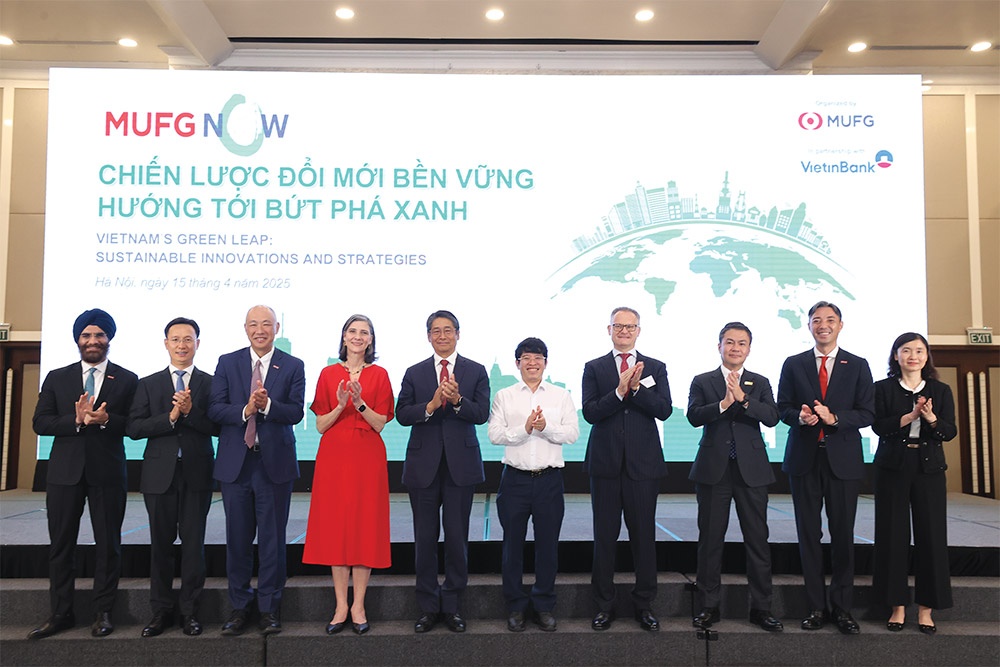MUFG N0W champions sustainable innovations and strategies
As part of commitments to support Vietnam’s sustainability journey through thought leadership and engagement, MUFG Bank hosted Net Zero World (N0W) in the capital last month, together with strategic partner VietinBank.
 |
| MUFG N0W 2025 aimed to promote sustainable innovation and strategies |
The second MUFG N0W combined three panels which focused on smart manufacturing, innovation and solutions in renewable energy, as well as strategies for greening supply chains. There were also case studies presented by MUFG’s corporate clients on best practices in leveraging sustainable finance for their business requirements.
At the event, there were lively discussions about how sustainability has become firmly engrained in operational decisions. Advanced technologies such as AI have also drawn great interest for their ability to streamline production processes, reduce emissions, and lower energy costs, all in pursuit of carbon neutrality and reduced carbon footprints.
“Smart and clean manufacturing forms the bedrock of our commitment to achieving net-zero emissions by 2050,” stated panellist Ngo Thai Vinh Nguyen, a solutions manager at Mitsubishi Electric.
The development of a domestic carbon market was also mentioned as an opportunity for businesses to participate and take advantage of relevant financial mechanisms.
At a panel on renewable innovations and solutions, representatives of companies such as Marubeni Asian Power, Levanta Renewables, and Green Carbon Vietnam discussed insights on recent developments, government policies and regulations, and the solutions available for businesses to engage in renewable energy. Notwithstanding advancements thus far, there was consensus that more can be done, including greater access to capital, ensuring policy reliability, and reducing the impact of taxes and fees on production costs. Along these lines, the Vietnamese government has enacted laws, policies, and programmes to encourage a circular economy and sustainable production and consumption.
“As per the Environmental Protection Law 2020, companies operating in Vietnam in the direction of circular economy will need to determine the construction of a sustainable supply chain,” said Nguyen Dinh Tho, vice president at the Institute of Strategy and Policy on Agriculture and Environment, under the Ministry of Agriculture and Environment.
“These supply partners will not only focus on production or product quality, but they will have to invest in research, design green, environmentally friendly product packaging, then build an optimal production process and also the stage of approaching consumer habits and behaviours to build a plan to collect and treat waste for their products,” Tho added.
Concurrently, international organisations are playing a pivotal role in shaping policy frameworks and support programmes to aid businesses in transitioning to greener production practices.
At another panel on sustainable supply chains, companies like Unilever Vietnam, Mitsubishi Research Institute (MRI), and Aquila shared insights into the vital role of greener supply chains, emphasising their commitments, the challenges they face, and the solutions required. A panellist from MRI highlighted that the primary challenge for most companies is financial, with insufficient funding to implement emission-reduction measures.
Additionally, businesses struggle to raise product prices despite incurring extra costs for solutions to reduce greenhouse gas emissions, which are embedded in production expenses. This poses a substantial hurdle for manufacturers, and so international corporations should consider providing technical and financial support to their suppliers to facilitate participation in low-emission production.
From a banking perspective, MRI observed that opportunities abound for banks to offer products and services, such as sustainable financial solutions, which are vital for strengthening supply chain resilience.
In Vietnam, MUFG stands out as a bank supporting its partners through related finance initiatives.
“We are steadfast in our commitment to supporting the nation’s decarbonisation efforts across key industries. Beyond hosting workshops, conferences, and exchange programmes focused on environmental, social, and governance (ESG) for clients, we have developed comprehensive finance solutions, including green loans, sustainability-linked products, and green trade finance offerings. These initiatives have been met with enthusiastic responses from our clients,” said Masao Kojima, MUFG’s regional head of Vietnam.
MUFG in Vietnam has also recently published its inaugural Sustainability Report, a voluntary initiative and a significant milestone in its operations and a source of immense pride. “This report represents a major step forward in engaging stakeholders on climate issues. It details our ESG initiatives and outcomes, underscoring commitment to fostering a brighter future. We hope it proves valuable and inspires new ideas for your organisation,” Kojima said.
What the stars mean:
★ Poor ★ ★ Promising ★★★ Good ★★★★ Very good ★★★★★ Exceptional
 Tag:
Tag:
Related Contents
Latest News
More News
- Masan Consumer names new deputy CEO to drive foods and beverages growth (February 23, 2026 | 20:52)
- Myriad risks ahead, but ones Vietnam can confront (February 20, 2026 | 15:02)
- Vietnam making the leap into AI and semiconductors (February 20, 2026 | 09:37)
- Funding must be activated for semiconductor success (February 20, 2026 | 09:20)
- Resilience as new benchmark for smarter infrastructure (February 19, 2026 | 20:35)
- A golden time to shine within ASEAN (February 19, 2026 | 20:22)
- Vietnam’s pivotal year for advancing sustainability (February 19, 2026 | 08:44)
- Strengthening the core role of industry and trade (February 19, 2026 | 08:35)
- Future orientations for healthcare improvements (February 19, 2026 | 08:29)
- Infrastructure orientations suitable for a new chapter (February 19, 2026 | 08:15)






















 Mobile Version
Mobile Version